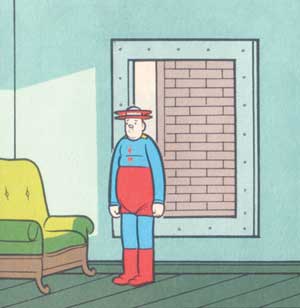Update your bookmarks!
Gerry Canavan's blog has moved.
Gerry Canavan's blog has moved.
Dear Friends,
Due to unfortunate considerations of time and cost, Backwards City is no longer a print journal. However, we will maintain our presence on the web that, however meager, we hope you might enjoy.
RECENT POSTS
MOST RECENT POST
Literary Hoaxes
Your Three Wishes: F.A.Q.
Brandenn (Why You Should Buy a Copy of This Week's...
'If You Find This World Bad, You Should See Some o...
Sometimes an Old Flame Went Out for a Reason
Under the Banner of Heaven
Fastest Man Alive
The Essentials
Magazine Covers of the Future
Can't Stop the Signal
Literary Hoaxes
Your Three Wishes: F.A.Q.
Brandenn (Why You Should Buy a Copy of This Week's...
'If You Find This World Bad, You Should See Some o...
Sometimes an Old Flame Went Out for a Reason
Under the Banner of Heaven
Fastest Man Alive
The Essentials
Magazine Covers of the Future
Can't Stop the Signal



LINKS
Lit Blogs [+/-]
Us
Bookslut
Bookninja
Rake's Progress
Tingle Alley
The Elegant Variation
Arts & Letters Daily
MetaxuCafe
McSweeney's
Yankee Pot Roast
Poetry Daily
Verse Daily
Salon
Literary Journals [+/-]
Us
AGNI Magazine
Alaska Quarterly Review
Bat City Review
Ballyhoo Stories
Bellevue Literary Review
Black Mountain Review
Black Warrior Review
Blue Mesa Review
Born Magazine
Brick
Can We Have Our Ball Back?
Carolina Quarterly
Cincinnati Review
Columbia: A Journal of Literature and Art
Conduit
Conjunctions
Cranky
Creative Nonfiction
CUE: A Journal of Prose Poetry
CutBank
Denver Quarterly
DIAGRAM
Dispatch
Dos Passos Review
Ekphrasis
EPOCH
Exquisite Corpse
Fence
flashquake
Forklift, Ohio
Fourteen Hills
Fourth Genre
Ghoti Magazine
Glimmer Train
Gulf Coast
Harper's
Harpur Palate
Hayden's Ferry Review
Hunger Mountain
Ink & Ashes
Instant City
Land-Grant College Review
LIT Magazine
Margin
McSweeney's
Mid-American Review
Missouri Review
Narrative
New England Review
New Orleans Review
NOÖ Journal
Octopus Magazine
One Story
Orchid: A Literary Review
Oxford American
Paris Review
Pettycoat Relaxer
Plaztik Press
Ploughshares
Poets & Writers
Post Road
Professor Barnhardt's Journal
RE:AL
Red Mountain Review
River City
River Teeth
Rosebud Magazine
Roux Magazine
Santa Monica Review
Segue
Sewanee Theological Review
SGVPQ
Shampoo
Shenandoah
Sonora Review
South Loop Review
Spire Press
spork
Talking River
The Atlantic Monthly
The Baltimore Review
The Capilano Review
The Chattahoochee Review
The Florida Review
The Formalist
The Georgia Review
The Greensboro Review
The Iowa Review
The Kennesaw Review
The Literary Review
The New Yorker
The South Carolina Review
The Southeast Review
The Sycamore Review
Threepenny Review
Tin House
TriQuarterly
Witness
Zoetrope
zafusy
Comics [+/-]
Dial B for Blog
Drawn!
Rashomon
Monitor Duty
Comic Treadmill
NeilAlien
Absorbascon
Scott McCloud
The Comics Reporter
Paperback Reader
Spoilt!
Exploding Dog
Toothpaste for Dinner
A Lesson Is Learned but the Damage Is Irreversible
Pop Culture [+/-]
Ain't It Cool News
Metaphilm
Television Without Pity
The Dust Congress
Meta [+/-]
Boing Boing
MetaFilter
Gravity Lens
Cynical-C
Linkfilter
GeekPress
Memepool
MonkeyFilter
Wikipedia
Technorati
The Show (with Ze Frank)
Games [+/-]
Jay Is Games
Little Fluffy Industries
Grand Text Auto
Slashdot
Our Writers[+/-]
Issue 6David Axe & Matt Bors
Eric Greinke
B.J. Hollars
Cynthia Luhrs
T. Motley
xkcd
Lynne Potts
Peter Schwartz
Sarah Solie
Jennie Thompson
Juked
NOÖ Journal"
Reene Wells
Issue 5
http://www.idiotcmics.com/">Idiot Comics
Ira Joel Haber
Jonathan Baylis & David Beyer Jr.
Kathleen Rooney
BookNinja
Issue 4
Kristy Bowen
Abigail Cloud
Will Dinski
Toothpaste for Dinner
The Flowfield Unity
Tom K
Dispatches from Roy Kesey
Austin Kleon
Kristi Maxwell
Marc McKee
Sheryl Monks
Renee Wells
Issue 3
Rafael �vila
Lynda Barry
Melissa Jones Fiori
Eric Joyner
Jonathan Lethem
Brian MacKinnon
Clay Matthews
Jesse Reklaw
Matthew Simmons
Amish Trivedi
Debbie Urbanski
Bart Vallecoccia
Issue 2
Jeremy Broomfield
baseWORDS
Nick Carbo
Adam Clay
Kurtis Davidson
Lisa Jarnot
Patricia Storms
Chris Vitiello
Issue 1
Tom Chalkley
Peter S. Conrad
Cory Doctorow
Arielle Greenberg
Gabriel Gudding
Paul Guest
John Latta
K. Silem Mohammad
Jim Rugg
Marcus Slease
Tony Tost
Kurt Vonnegut
Friends & Associates [+/-]
UNCG Writing Program
Meme Therapy
Candleblog
Desert City Poetry Series
Owlly.com
The Regulator Bookshop
Mac's Backs Paperbacks
Bull's Head Bookstore
Quail's Ridge Books
McIntyre's Fine Books
Chop Suey Books
McNally Robinson Bookstore
Adams Books
The Writer's Center Book Gallery
Project Pulp
Council of Literary Magazines and Presses
Association of Writers and Writing Programs
Small Beer Prees
Ed Cone
The Green Bean
New York Pizza
Triangle Bloggers
Greensboro 101
PClem's Music Blog
Our Frappr Map
ARCHIVES [+/-]
May 2004 June 2004
July 2004
August 2004
September 2004
October 2004
November 2004
December 2004
January 2005
February 2005
March 2005
April 2005
May 2005
June 2005
July 2005
August 2005
September 2005
October 2005
November 2005
December 2005
January 2006
February 2006
March 2006
April 2006
May 2006
June 2006
July 2006
August 2006
September 2006
October 2006
November 2006
December 2006
January 2007
February 2007
March 2007
April 2007
May 2007
June 2007
July 2007
August 2007
September 2007
October 2007
December 2007
March 2008
July 2008
September 2008
October 2008
November 2008
December 2008
October 2009
November 2009

Copyright © 2004-2007 Backwards City Publications of Greensboro.
All rights reserved.
